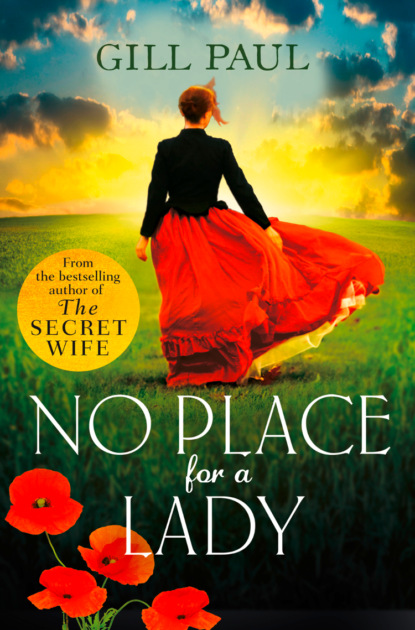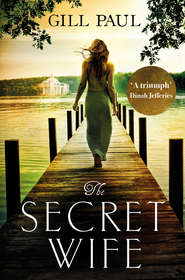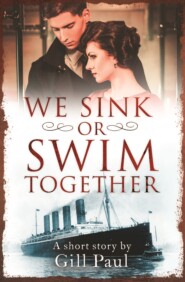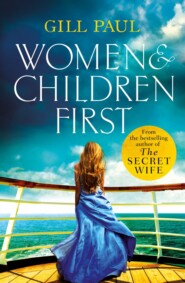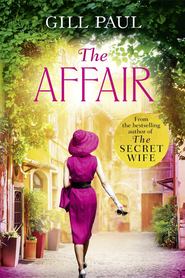По всем вопросам обращайтесь на: info@litportal.ru
(©) 2003-2024.
✖
No Place For A Lady: A sweeping wartime romance full of courage and passion
Автор
Год написания книги
2018
Настройки чтения
Размер шрифта
Высота строк
Поля
‘Should I take him to the hospital tent?’ she asked Charlie.
‘Don’t,’ was his advice. ‘No one who goes there comes out alive. I hear it’s best to nurse patients in isolation. Lucy and I will move out of the tent to give you space, and will leave supplies for you outside.’
Lucy’s throat was tight with fear – what if their patch of land was poisoned? What if Charlie caught the cholera? – but she was determined to be strong. ‘Don’t worry about anything but caring for your husband,’ she told Adelaide. ‘I’ll bring water and food, and will empty bedpans if you leave them outside. Tell me whatever you need and I’ll find it.’
Adelaide helped Bill to lie down in the tent and moistened a cloth to wipe his brow. ‘A cure,’ she said, her voice choked up. ‘I need a cure.’
Charlie and Lucy retrieved their bedding and slept under the stars, as they had done on the first night in Varna. They clung together, both terrified but unwilling to put their fears into words. Lucy decided she would write to her father asking if he knew any remedies and presumably he would then ask Dorothea’s advice. Perhaps she would send some miraculous medicine post-haste.
Next morning, Lucy called to Adelaide from outside the tent and was relieved to hear that Bill’s condition was not any worse. She set off to get fresh water, the legs of her drawers tied tight to deter leeches. While she was filling her bucket, she saw one of the Sisters of Charity who accompanied the French army and in her best French asked for advice on treating cholera.
‘The doctors give calomel for purging,’ the Sister told her, ‘but we believe it only increases the agony. Keep your friend’s temperature down with cool cloths and feed him tiny sips of water and chicken broth. May God be with you all.’ She made the sign of the cross.
Lucy took a bucket of fresh water back to their tent and called to Adelaide, telling her the advice she’d received and adding that she was setting out to beg for a chicken from one of the farmers. At the same time she would post the letter she had written.
‘Don’t take any risks on our account,’ Adelaide called. ‘Stay well clear of others. I couldn’t forgive myself if anything happened to you …’
Lucy had never made chicken broth before but with Adelaide calling instructions from inside the tent, she managed to produce a palatable brew and she left a large bowl of it by the tent flap, along with half a loaf of black bread.
For two days and two nights, neither Bill nor Adelaide emerged and there was little sound from inside the tent but Lucy could tell from the contents of the bedpans that the illness continued. She felt desperately lonely and scared during the day when Charlie went about his duties, and every evening she examined him for possible symptoms – was his brow slightly warm, his complexion pale? – but he seemed fine. Fatalities multiplied and coffins had to be constructed from any materials that could be found: Lucy saw one that read ‘Bass’s Superior Pale Ale’ on the side, which seemed horribly disrespectful to the dead. Was life really so cheap that a man could be full of life one day and buried in a beer crate the next?
On the third day of Bill’s illness, Charlie went hunting and brought back four quail. He plucked them then Lucy roasted them, following Adelaide’s method, and she was delighted to hear that Bill had managed to eat a small portion. He must be on the mend, and, thank God, Adelaide was showing no signs of having caught the disease.
Only when she and Charlie lay down to sleep that evening did Lucy dare to put into words the fearful thought that had been in her mind these last days, making her chest tight with nerves: ‘Promise me you won’t die out here,’ she whispered.
‘Of course I’m not going to die,’ he replied, stroking her hair back from her face. ‘I’m Lucky Charlie! I didn’t catch the cholera and I’ve got you for a wife.’
They made love for the first time since Bill had fallen ill, and Lucy clung to him, feeling the warmth of his skin, the beating of his heart, the rise and fall of his chest, all the signs that his body remained healthy. He stroked her hair and kissed her eyes, her nose, her neck. ‘You are extraordinary,’ he whispered. ‘Lord knows, I don’t deserve you but somehow I am lucky enough to have you in my arms and nothing could make me let you go.’ His voice cracked with emotion and Lucy had never loved him more; this must be what Adelaide meant when she said love deepens in times of adversity.
During the night she woke to hear Charlie mumbling in his sleep. She leaned in to listen and suddenly he grabbed her in a tight embrace and whispered ‘Susanna’ with such longing in his voice that her blood froze. The name had been clear, no question. Her insides twisted with jealousy. Who was Susanna and why did it sound as if Charlie felt so passionately about her? Was she a woman with whom he had been in love before he met her? If so, why had he not mentioned her? Perhaps he loved her still. She dismissed the thought – Charlie’s love for her seemed beyond question – but all the same she found it hard to get back to sleep.
Chapter Eight (#ulink_d7140513-2533-5347-80f8-db4ffcbbb17b)
Once Bill had recovered sufficiently to emerge from the tent and rest in the nearby shade or go for gentle strolls to regain his strength, Adelaide was able to keep Lucy company once more, and the women became closer than ever. They were chatting together when Mrs Williams came by to ask after Bill.
‘He is much better,’ Adelaide replied. ‘Thank you for your concern.’
‘The 8th has been hit bad,’ Mrs Williams told them. ‘We’ve lost several men, and poor Mrs Blaydes has perished.’
‘Mrs Blaydes? Oh no!’ Lucy was distraught to hear of the loss of someone she had known, albeit slightly. ‘And some of our men? Which ones?’
Mrs Williams rattled off a list of names, and tears filled Lucy’s eyes. ‘Their poor wives. What will they do now? I must visit them.’
Adelaide extended a restraining hand. ‘Perhaps you had best not visit. I’m sure Mrs Williams will extend your heartfelt sympathies and let you know if there are any services you can perform for them.’
‘Of course,’ Mrs Williams agreed, her head bent.
After she left, Lucy told Adelaide about her letter to her father and her secret hope that Dorothea would write with advice that would help all cholera sufferers in the camp.
Adelaide poked the fire with a stick to stir the embers. ‘My dear, if it is a painful subject then you needn’t answer, but I am curious to know more about the argument with your sister. Was it simply because of Charlie or were you never particularly close?’
Lucy tried to answer truthfully. ‘I think we were close once but it changed after my mother fell ill when I was seven years old. Dorothea appointed herself chief nurse and I was only allowed to see Mama when she said it was convenient. She often scolded me for making noise while Mama was trying to sleep and I suppose I began to resent her for keeping me away. Whenever I visited, Mama seemed cheerful and pleased to see me so it didn’t appear I was doing any harm. She always liked me to play and sing for her, right up to the end …’
‘How many years was she bedridden?’ Adelaide touched Lucy’s arm with empathy.
Lucy tried to remember. ‘Six years, more or less. Sometimes she came down to the parlour but such occasions were rare. They scared me because she looked so frail that I worried she would slip on the staircase. She seemed safer in bed, propped up on her pillows, and that’s where she spent most of her time until she died. Dorothea didn’t waken me that night but told me in the morning.’
Fresh tears came to her eyes, even five years on. ‘I had no chance to be there as she passed away, to hold her hand and tell her how much I loved her, but Dorothea thought I wasn’t old enough, that it would be too distressing for me. She made that decision on my behalf.’ Lucy was surprised how angry she felt talking about it, even now.
‘I expect she did what she thought was best.’ Adelaide pursed her lips.
‘No doubt she would say she did what she thought was best when she wrote to Charlie’s family trying to prevent our wedding, and got a barrister friend of hers to write to Major Dodds.’
An intake of breath signalled Adelaide’s surprise at this disclosure. ‘Goodness! I can understand her trying to persuade you that eighteen is rather young to come to war, but perhaps she went too far. I’m sure she only did it because she loves you.’
Lucy shook her head. ‘She has to be in charge. After Mama died, she was constantly scolding and correcting me. I was always in trouble for taking my gloves off when etiquette said I should not, or wearing a coat she thought was not warm enough, or talking too much in company. But although she may be thirteen years older, she is not my parent and does not have the right. So I often disobeyed, knowing Papa would take my side.’
‘And he consented to your wedding?’
‘Of course! He likes Charlie. Why wouldn’t he?’ Lucy felt defensive.
‘I suppose he too must have worried about you coming out here with a man you haven’t known for terribly long …’ Adelaide’s voice trailed off.
Lucy looked at her. Was she taking Dorothea’s side? ‘Papa simply wants me to be happy.’
‘So Dorothea was twenty-six when your mother died? I suppose devoting herself to nursing her meant she had missed her opportunity to marry. Such a shame.’
‘I’m not sure Dorothea was ever interested in men.’ Lucy picked up a stick and began to trace a pattern in the dusty ground. ‘She’s too domineering. She volunteered to work at the Pimlico Charitable Hospital after Mama died, where I imagine she is very bossy. She has no time for anyone who doesn’t agree with her.’
‘It’s good that she lives a useful life. I hope she enjoys her work?’
Lucy pondered this. ‘I suppose she wouldn’t do it if she didn’t enjoy it. She talks about it a lot. I only hope she writes soon, and maybe she will be able to send us some medicine to cure cholera. I expect it will be accompanied by long lists of instructions about what to do, what to avoid; you can count on that.’
‘A family rift is such a sadness. I worry about you and Charlie both being estranged from your kin. Promise me you will make peace with Dorothea after the war.’
‘Only if she will respect our marriage and treat me as an adult.’ Lucy folded her arms, determined that any apology should come from her sister since she had done nothing wrong.
That evening, Charlie and Lucy went for a stroll in the moonlight, arms linked, and she mentioned that she had written to her father and very much hoped that Dorothea would send advice on preventing cholera.
Charlie seemed hurt. ‘Why did you write to them? We have each other now. Dorothea only ever caused trouble for us and, to be frank, your father doesn’t know the day of the week. You and I don’t need anyone else.’
Lucy squeezed his arm. ‘Of course we don’t, darling. I only wrote because of the cholera. Don’t be cross with me.’
He fell silent and she could tell from the way he stiffened and peered into the distance that he was cross about it. He wanted her all to himself. Perhaps he was worried that Dorothea would try to persuade her to return home again – as no doubt she would. But nothing would make Lucy leave now. How would Bill have survived cholera without Adelaide’s tender care? If anything should happen to Charlie, she wanted to be there to offer the same comfort.
*
The summer passed slowly and Lucy grew increasingly frustrated with the delay in any fresh orders coming through. She missed her home, her friends and her father, and the novelty of living in a tent had long since grown tiresome. Towards the end of August, rumours began to spread that the troops were set to sail for Crimea but that officers’ wives must be left behind in Varna, since there would be no decent accommodation for them once the army was on the move.





